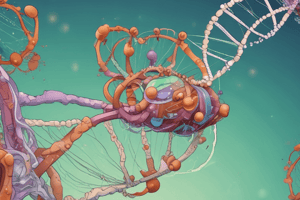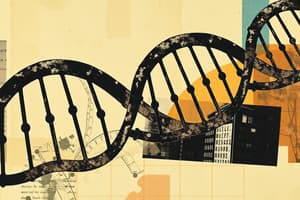Podcast
Questions and Answers
What is the role of transfer RNA (tRNA)?
What is the role of transfer RNA (tRNA)?
- Synthesizes proteins
- Carries genetic information from DNA
- Makes the ribosomes
- Delivers amino acids to the ribosomes (correct)
What is messenger RNA (mRNA)?
What is messenger RNA (mRNA)?
A copy of the DNA that travels from the nucleus into the cytoplasm
What does ribosomal RNA (rRNA) do?
What does ribosomal RNA (rRNA) do?
Makes the ribosomes and helps to read the information from mRNA
What is the function of DNA in protein synthesis?
What is the function of DNA in protein synthesis?
RNA is double-stranded.
RNA is double-stranded.
There are two types of RNA.
There are two types of RNA.
What sugar does RNA have?
What sugar does RNA have?
Match the following definitions with DNA or RNA:
Match the following definitions with DNA or RNA:
There is ______ type of DNA.
There is ______ type of DNA.
There are ______ types of RNA.
There are ______ types of RNA.
What is a key distinguishing feature of DNA compared to RNA?
What is a key distinguishing feature of DNA compared to RNA?
Study Notes
tRNA (Transfer RNA)
- Delivers amino acids to ribosomes for polypeptide chain assembly.
- Contains anticodons that pair with mRNA codons.
- In RNA, thymine (T) is replaced with uracil (U).
mRNA (Messenger RNA)
- Serves as a copy of DNA, moving from the nucleus to the cytoplasm.
- Carries genetic information required for protein synthesis to ribosomes.
- Contains codons; also uses uracil instead of thymine.
rRNA (Ribosomal RNA)
- Constitutes the building blocks of ribosomes.
- Plays a crucial role in interpreting the information encoded in mRNA.
DNA (Deoxyribonucleic Acid)
- Contains all genetic information and serves as a template for protein synthesis.
- Undergoes transcription to produce mRNA for use in protein synthesis.
Transcription in Protein Synthesis
- Involves copying information from DNA to mRNA, directing the synthesis of proteins on ribosomes.
RNA Characteristics
- RNA is single-stranded.
- Uses uracil to bind with adenine.
- Comprises ribose sugar.
DNA Characteristics
- DNA is a double-stranded helix.
- Utilizes thymine to bind with adenine.
- Contains deoxyribose sugar and only exists in the nucleus.
Comparison of DNA and RNA
- Both DNA and RNA are made up of long chains of nucleotide units.
- RNA is found in both the nucleus and cytoplasm, whereas DNA is exclusively in the nucleus.
Types of Nucleic Acids
- There is one type of DNA.
- There are three types of RNA: mRNA, tRNA, and rRNA.
Studying That Suits You
Use AI to generate personalized quizzes and flashcards to suit your learning preferences.
Description
This quiz explores the essential roles of tRNA, mRNA, and rRNA in the process of protein synthesis. Understand how each type of RNA contributes to translating genetic information into functional proteins. Ideal for students learning about molecular biology and genetics.




